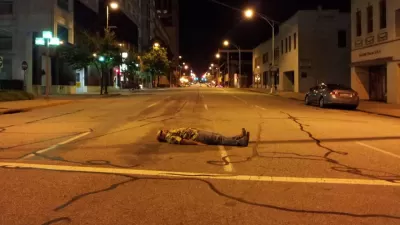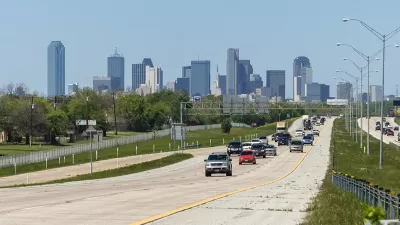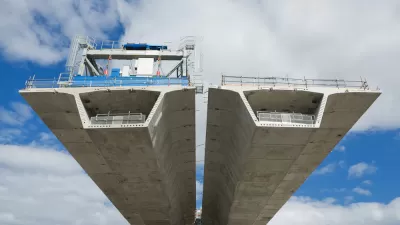From his home in Brainerd, Minnesota (population 13,500), this fiscally conservative engineer leads a growing movement. His slow-and-steady approach to urban development has real bipartisan appeal.

As a civil engineer, Charles Marohn used to oversee projects that widely overshot the mark, providing unnecessary infrastructure and saddling towns with inflated costs. He realized that the suburban mainstream offered "solutions that not only encouraged sprawl, but also created places that were financially unsustainable."
Peter Callaghan reports on the man behind Strong Towns, first a blog and now a non-profit dedicated to the economic viability of existing communities.
Marohn is anti-suburb, but he doesn't fit the typical urbanist profile. "He describes himself as a fiscally conservative Republican; most of those who share his philosophy are liberal Democrats. Also, he was a civil engineer first, not a city planner."
"It's a perspective that has led Marohn to conclude that the nation's 70-year experiment with suburban development is a failure — because it is economically unsustainable. That is, the lack of density does not produce tax revenue necessary to cover current services, let alone the long-term costs of maintaining and replacing those services."
In Marohn's words, "Woodbury is going away, no matter what. There is no renewal process. There is no next step in its evolution." He sees both parties as complicit in an "infrastructure cult" dedicated to top-down projects, be they highways or transit. Instead, he says, we should look to the period before the postwar suburban boom for wiser models.
FULL STORY: Why a conservative Republican from northern Minnesota wants to kill the suburbs

Manufactured Crisis: Losing the Nation’s Largest Source of Unsubsidized Affordable Housing
Manufactured housing communities have long been an affordable housing option for millions of people living in the U.S., but that affordability is disappearing rapidly. How did we get here?

Americans May Be Stuck — But Why?
Americans are moving a lot less than they once did, and that is a problem. While Yoni Applebaum, in his highly-publicized article Stuck, gets the reasons badly wrong, it's still important to ask: why are we moving so much less than before?

Research Shows More Roads = More Driving
A national study shows, once again, that increasing road supply induces additional vehicle travel, particularly over the long run.

Which US Rail Agencies Are Buying Zero-Emissions Trains?
U.S. rail agencies are slowly making the shift to zero-emissions trains, which can travel longer distances without refueling and reduce air pollution.

San Diego School District Approves Affordable Housing Plan
The district plans to build workforce housing for 10 percent of its employees in the next decade and explore other ways to contribute to housing development.

Lawsuit Aims to Stop NYC’s ‘City of Yes’ Zoning Reforms
A lawsuit brought by local lawmakers and community groups claims the plan failed to conduct a comprehensive environmental review.
Urban Design for Planners 1: Software Tools
This six-course series explores essential urban design concepts using open source software and equips planners with the tools they need to participate fully in the urban design process.
Planning for Universal Design
Learn the tools for implementing Universal Design in planning regulations.
City of Moreno Valley
Institute for Housing and Urban Development Studies (IHS)
City of Grandview
Harvard GSD Executive Education
NYU Wagner Graduate School of Public Service
City of Cambridge, Maryland
Newport County Development Council: Connect Greater Newport





























